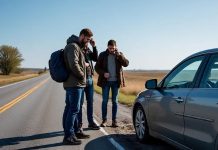
Road trips lasting memories, which you’ll be sharing around the dinner table with fond laughter. To go on a road trip is a unique experience. You can connect with family or friends, discover hidden gems, and clear your mind.
Nothing can compare to getting out on the open road. If you want to escape New York, Westerly (Rhode Island), Cape May (Jersey Shore), and Alexandria (Virginia) are perfect for a mini-break. There are countless scenic roads, delightful towns, and acres of wild forest to uncover.
Unfortunately, accidents take place frequently during road trips. There are several reasons why road trips increase the risk of a car accident, including the driver’s ignorance of the roadways and/or driving routes, distracted driving, fatigue from driving long hours, and vehicle failure.
If the road traffic accident wasn’t your fault, you might be entitled to claim compensation. Compensation payments tend to be higher in the U.S. than in the U.K., as highlighted by the specialists at Personal Injury Claims UK. Lawyers only accept cases involving severe injuries and significant pain and suffering.
If you’re planning a road trip and fear that the worst could happen, these tips can help you enhance your safety. Make the right kind of memories when traveling.
Carry Out a Pre-Trip Inspection
You can’t control what other drivers do on the road, but you can manage your reaction. Get your car ready for a road trip. In other words, take the time to do a little pre-trip inspection.
Make sure the vehicle and its major systems are all right to maintain safety on the road. Check the battery to make sure the connection is tight and corrosion-free. It would be best to leave it up to a professional. Other critical considerations for pre-trip inspection include:
- Inspect the belts and hoses
- Check the levels of your car’s fluids (engine oil, power steering fluid, transmission fluids, and windscreen washer fluid)
- Make sure interior and exterior lights are working properly
- Check the car’s air conditioning system
- Test your brakes
- Inspect the tires’ condition
Regardless of the destination, get your vehicle trip ready. It should get you there and back.
Plan Your Route Ahead of Time
If you have a stress-free journey, you’re more likely to enjoy the road trip. Plan your route in advance, whether you use a traditional road map or GPS. Know what issues lie ahead so that you can plan accordingly.
Roadworks and route closures may affect your travel. Identify several routes to your destination in case you’re forced to make a detour. As you plan ahead, spot potential high traffic areas and other hazards.
Road trips are filled with fun, but they can also be fraught with danger. It’s recommended to take a paper map with you. You can see the bigger picture, not to mention that it comes in handy if your GPS stops working.
Get Enough Sleep the Nights Leading to The Road Trip
Get enough quality sleep before the road trip. Caffeine will only take you so far. It’s dangerous to drive drowsy. You’ll have a delayed reaction, and that’s the worst that can happen when driving. Plus, your decision-making is impaired.
Sleep deprivation has the same effect on the body as alcohol consumption. Put simply, lack of sleep can lead to impaired decision-making and poor judgment.
To ensure your safety and that of the passengers, get plenty of zzzs the nights leading to the road trip. Go to bed early so that you wake up refreshed. Get the correct amount of sleep before you hit the road.
Avoid Packing Excess Baggage
You don’t have to worry about airport security checkpoints or airline baggage fees, but you do have your work ahead of you. Minimize your load and pack only what you need. The additional weight, width, and length sources will affect your driving conditions.
How so? Well, it feels as if the car is struggling. You need to have a firm handle on the gearstick to prevent damage and boost fuel economy. As a rule of thumb, you should never overload your vehicle. On the contrary, try to distribute the weight equally.
Virtually all luggage should be placed in the vehicle’s boot. Place the heaviest items first. If possible, secure or attach the luggage to the anchors in the boot.
Regularly Swipe Over Driving Duties
Sleepiness becomes a problem during a long drive. Taking regular breaks will help you keep your energy up and stay alert while driving. Plus, the journey is more enjoyable. If you’re traveling with licensed passengers, it’s a good idea to swipe over driving duties every now and then.
You shouldn’t be spending the entire time driving. The person in the car’s passenger seat can make or break the trip. If you share the vehicle with multiple drivers, you must be insured.
At any rate, driving for long periods of time requires concentration, so you feel overly tired and lack energy. Rotating with one or more drivers helps you avoid an accident.
Enforce The Seatbelt Rule
All you want to do is relax and unwind on a road trip. The last thing you want to do is to buckle up your seatbelt. Maybe not, but it will prevent you from being ejected during a crash. You and your passengers should wear your seatbelts to ensure the utmost safety.
It’s an easy way to avoid injury risk. Make sure every person in the vehicle is using a safety belt. Your kids might refuse to wear theirs.
This is a problem considering that traveling is so dangerous these days. Make sure your children are safely and securely restrained. Explain that they might get hurt if there’s an accident.
To sum up, car accidents happen all the time. To avoid getting into one yourself, you need to be highly cautious. It can save you headaches, not to mention unnecessary expenses. Road trips are meant to be filled with joy, but that’s only true if you drive safely and take the necessary precautions.
Want to read more of our latest posts? Check out our review of Happy Snapper Seafood in Orlando.









